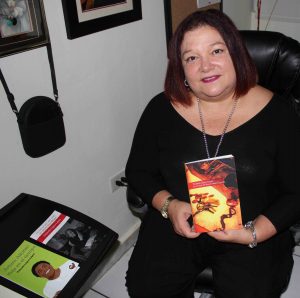
Dr. López proudly displays her published books.
Yolanda López López, MD, MA, a rheumatologist in Bayamón, Puerto Rico, says she’s been writing “forever.” But when she was in high school, several teachers, counselors and others persuaded her against selecting writing as a profession or even getting a college degree in literature because she wouldn’t be able to earn a comfortable living. At the time, she was told that good-paying writing jobs were simply not to be found.
So Dr. López chose medicine, her other passion, as her career and has served in private practice for more than 30 years. She never stopped writing, though, and in 2011, earned a master’s degree in creative writing from Universidad del Sagrado Corazón, a private college in Puerto Rico. She has now had a novel published and is completing a second novel and an assortment of short stories while working on two books about rheumatoid arthritis and fibromyalgia.
“Writing gives me a lot of energy,” she says. “It frees your mind. You can create, travel, go back and forth in time. It’s like you’re living in that time or space. You can actually feel it.”
Solving Mysteries
Dr. López completed her medical education at the University of Puerto Rico School of Medicine. Initially, she wanted to pursue a career in psychiatry. But during her fourth year of medical school, she completed a rotation in psychiatry and changed her mind.
“I became depressed,” recalls Dr. López. “[Psychiatry] was too much. But when I went into rheumatology during my rotation, I just fell in love with the patients and the challenges of trying to find things out. They have a sign or symptom, and you keep searching until you find out what the
patient has.”
She graduated from medical school in 1980, finished her internship in 1981, completed her two–year residency program in 1983, and then spent another two years in rheumatology. In 1985, she opened her private practice.
During the 1990s, she conducted research at her office on rheumatology drugs, including Vioxx and Forteo. From 1996 to 2008, she served as a speaker for MSD, Eli Lilly, Pfizer and others on such topics as osteoporosis, fibromyalgia and rheumatoid arthritis.
Fiction to Biographies
While pursuing a successful career in medicine, Dr. López never abandoned writing. Her MA thesis was actually a novel, La caída de Alejandro Curtos (The Fall of Alejandro Curtos).
“It’s about an obstetrician who’s at the end of his professional career and is [sued for malpractice for the first time],” says Dr. López. “It deals with his issues and drama. There’s another story within this story, which is about his grandmother’s move from France during WWII to Puerto Rico. She’s his inspiration and gives him strength.” If you want to know the ending, you’ll have to buy the book, which was published in 2013 as an eBook on Amazon (https://tinyurl.com/y89z9kfz).
Her other novel is about a real-life event that happened in Puerto Rico in 1931. Although never prosecuted, a doctor claimed to have murdered a handful of patients. Writing this story, she says, demands a lot of online research and scouring the archives of the local newspapers.
“I searched the internet for music from the 1920s and 1930s,” she says. “While writing, I wear headphones listening to these songs. It’s like traveling back in time.”
Moving forward in time nearly a century, she is also tackling short biographies of famous black Puerto Ricans: Pura Belpré, who was the first Hispanic black employee at the New York Public Library, and Arturo Alfonso Schomburg, who’s known as the
father of American Negro history. Another story is about a fictitious young, black, slave girl who sneaks out of the master’s mansion to play with friends. (Puerto Rico did not ban slavery until 1873.)
“I’m a member of a study group called Cátedra de Mujeres Negras Ancestrales (Black Ancestral Females) that deals with the subject of [black people] and their contributions throughout history,” says Dr. López. “I really have done a lot of work with them. It’s been a wonderful experience.”
She also plans to tell one more particular story: The tale of Hurricane Maria, which slammed into Puerto Rico on Sept 20, 2017, with 175 mph winds. For 30 straight days, Dr. López kept a diary and collected information about the U.S. government’s painfully slow response, as well as local response activity. She blames Hurricane Maria for her mother’s death five days later, most likely from heat exhaustion.
“I learned that in some places, they had to open the gates of Puerto Rico’s Guajataca Dam and didn’t really notify the persons living around the dam,” she says. “The area was flooded and complete families died. The government hasn’t said anything and didn’t pay attention to it.”
Whether she’s writing about recent history, fictitious characters or real people who lived years ago, Dr. López says writing helps her cope with the daily stresses and frustrations of her job and highly recommends it to other physicians.
Coping Mechanism
“If you’re able to sit down and confess to yourself by writing a few lines about how you feel—maybe you’re tired or are in emotional pain—you can be a better doctor to your patients and maintain or improve your mental health,” says Dr. López. “Writing really helps you deal with a lot of things that go on in medicine.”
Carol Patton is a freelance writer based in Las Vegas.

